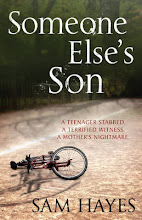Obviously, marketing a book costs. And from what I gather, to do it properly costs a lot. These days, there are many ways to market a book--newspaper adverts, tube posters and other poster campaigns (taxis, buses, mainline stations etc), television adverts, in-store promotions such as the lovely 'front table' or the 3 for 2, other paid-for promotions...maybe competitions, perhaps alongside another 'compatible' product (think books and chocolate!). This is just scratching the surface and, as an author, it's completely out of my hands. I'm not the one with the budget (or not), the publisher is. And they decide how best to implement a marketing campaign for their titles. I've been much more involved with the publicity side of things (think marketing but for free!) as that's where an author can really help get things rolling at a book's launch and beyond. But that's another post.
I've been very lucky. My first novel BLOOD TIES was published within a fanfare of tube posters and in-store promotions. It's very hard to have a novel picked up by a supermarket or chain bookshop for their precious shelf space, but my first was stacked high in all three big supermarkets in their chart promotions, as well as appearing on the front tables in Waterstone's, WH Smith and poor old Borders. I remember accosting a woman in Asda. She was holding a copy of my novel and another book, weighing up which one to buy. 'Pick that one,' I suggested. 'Have you read it?' she asked, surprised I'd even shown an interest. 'I wrote it,' I told her. I don't think she believed me.
I went on a whirlwind tour of the underground with my publicist at the time. She proudly showed me some of the many posters plastered all over subterranean London (and a good number of mainline stations nationwide, too). I was hot from dashing around but immensely proud to see my book, my name, decorating tube stations. I have one of the posters. It's still rolled up in its container as I don't have a wall big enough to put it on!

The marketing campaign, along with lots of lovely publicity, really helped spread the word about BLOOD TIES. The book sold a lot of copies and it makes me wonder: Would this have happened without the marketing spend? Would publicity have been enough? Would 'word of mouth' have achieved the same figures?
Like I said, it's a huge subject and I'm not even a tiny bit of an expert on it - just a speculator, a consumer, a person whose books have been marketed. As a consumer, marketing works on me to a certain extent. If I see a poster or an advert for a new book and I like the sound of it - either by a favourite author or a new one - I'll certainly make a mental note to look it up online later. Then, based on the blurb, a quick flip through, perhaps online reviews, I'll decide whether or not to buy. So, for me, in that respect, marketing works. It draws my attention to books I perhaps wouldn't get to hear about. Or would I?
These days, most people (not all, I realise) have internet access and many will do as I do and check out books online, even if that's not where they end up buying. And of course with the rising popularity of Kindle and other e-readers, you're more likely than ever to research online. I suppose the perfect marketing food chain goes like this: Reader spots advert for book, reader comes across a piece in a magazine written by the same author featured in the advert, reader looks at author website and reads an excerpt of the book, reader buys book from local independent bookshop (as well as a Kindle edition or similar) and then reader, publisher and author are happy. All for an average price of around £4.50.
I have no breakdown of the cost of producing a book and neither do I know the average spend (or the smallest and the greatest) for a marketing drive. I'm convinced that for certain titles, the figure would be immense. We're all used to seeing huge advertising campaigns for the giant names but surely it's a circle that will only continue to grow once the wheels of paid-for promotions have begun to turn. What would happen to these authors if they didn't have marketing? I doubt Dan Brown would suddenly stop selling if his books weren't on the sides of buses or that John Grisham's loyal readers would quit waiting for his latest title if there were no posters. What would happen if unknown and debut novelists had a massive marketing spend instead? Would it be wasted? Would it be the start of great things for authors who wouldn't otherwise have been heard of? Is it fair that the book-buying public only get presented with a small number of books as we go about our daily business, the occasional advert for a new novel catching our eye?
I don't know the answer to these questions. The publishers hold the key to successful advertising. They have marketing departments filled with people who know their stuff. Authors trust them and keep writing books. It's the readers, the great book-buying public, who hold the key really, I suppose. We're the ones who respond to the advertising, we're the suggestible ones who maybe unconsciously react to what our brains have soaked up. So perhaps next time I'm in a bookshop I'll walk on past the front tables and the cardboard promotion stands and do eeny-meeny on some authors I haven't read before. Not that I don't anyway and I'll no doubt grab an armful of 3 for 2s on the way out.
BLOOD TIES had a television advert in Germany. The first cover for this title in Germany had the heads of two rather freaky porcelain dolls on the front. I had no idea what the advert said (apart from the 'Krimis und Thriller' bit). The dolls' eyes popped open at the end and everything. Three books down the line in Germany and 'Das Verbotene Zimmer' (TELL TALE) is currently hanging around number 10 on the Amazon.de crime and thriller list. Clearly dolls with popping eyes work well over there!

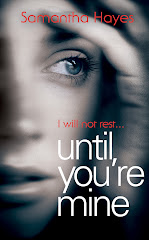


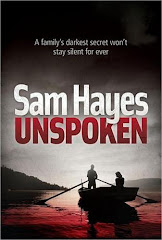
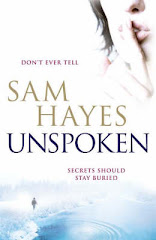
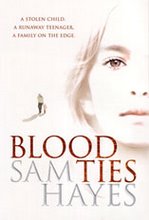


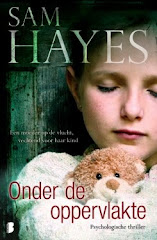
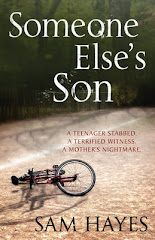
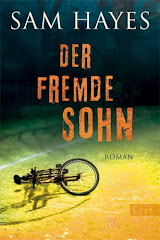

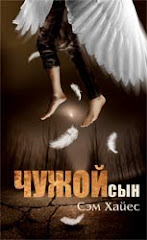
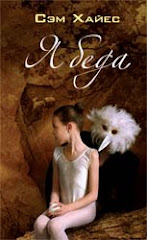
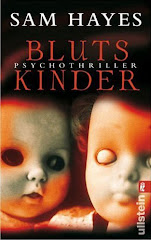
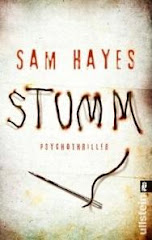
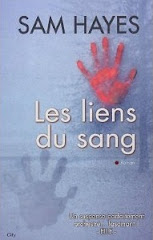

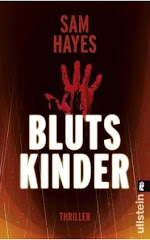

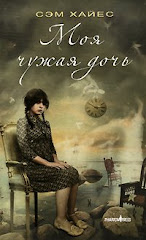
.jpg)
